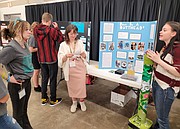Young scientists seek watershed solutions
COEUR d'ALENE — Neon green lettering drew passersby to learn about "Eco-Friendly BMPs."
In the world of water science, BMPs — best management practices — are ways to direct stormwater runoff. When stormwater management is done in an eco-friendly way, it makes for a happy Earth, which, in turn, is good for its inhabitants.
This was the focus of a yearlong project for Lake City High School juniors Riley Peite, Brock Ferguson and Jordan Packer, who enlightened the community about this subject Wednesday during the Youth Water Summit at the Kootenai County Fairgrounds.
“We researched the effectiveness of vegetative buffer strips,” Riley said, showcasing research and informational blurbs she and her partners included in their display.
"This project went really well," she said. "It helped us with the scientific process more and learning more of what you would do in a scientific career in the future. I really liked the teamwork."
Nearly 300 students from seven high schools presented their findings on a wide array of watershed issues and potential solutions during the Youth Water Summit. This annual event is the culmination of the Confluence Project, a yearlong, interactive water education initiative that encourages students to conduct in-person interviews and gather data through field research. Partners from the University of Idaho, The Coeur d’Alene Tribe, Kootenai Environmental Alliance, Idaho Department of Environmental Quality, Panhandle Health and IdaH2O team up for the Confluence Project to promote hands-on experience, field data collection and higher education degrees in the natural sciences.
Students select water-related topics with local relevance, such as stormwater pollution, water quality of lakes and streams, snowpack measurements or impacts to the aquifer. They then present their work to a panel of judges.
“Water can be complicated, but we try to break that down into bite-size chunks for these students,” said Jim Ekins, University of Idaho Extension water educator. "We teach the students actual science principles and techniques to help them do their own investigations."
Lake Pend Oreille High School senior Keona Studt and junior Tallulah Stafford zeroed in on how cigarette butts cause massive pollution in their "Don't Be a Butthead" project.
"It’s the most common form of shoreline waste worldwide,” Tallulah said. "We were shocked by how bad this issue was in this area specifically."
The young scientists created an eco-friendly cigarette receptacle, named "Stinky," that is sealed with cement to keep tainted water from leaching into groundwater.
"We wanted to reduce cigarette pollution by making a specific cigarette receptacle,” Keona said.
They shared that 80% of cigarettes on the ground end up in local water sources. One cigarette in a liter of water is a death sentence for freshwater fish.
"This matters, because you might not notice the effects at this moment, but attacking a problem at its source and before it becomes an issue is the better way to go,” Tallulah said. “We don’t want it to get to the point where it’s irreversible."
She said water is one of the three main things humans need to survive.
"We are very lucky with how beautiful our lake is, and we do have really good water quality in our lake," she said. "But the amount of cigarette butts you can find is substantial and it’s quite unattractive as well as it is polluting our shorelines. It goes all the way to the ocean."



